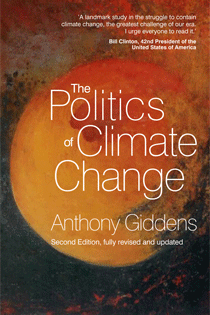By Germaine Cornelissen-Guillaume
Einstein’s quotes that “One need only think of the weather, in which case the prediction even for a few days ahead is impossible” and that “When the number of factors coming into play in a phenomenological complex is too large scientific method in most cases fails” apply even more so to climate change in view of the much broader time scale involved. Anthony Giddens deserves credit for addressing a complex problem and for doing so from the viewpoint of political issues posed by the prospect of global warming.
Global warming, or its implication in association with climate change, refers to observed increases in temperature attributed to greenhouse gas emissions produced by modern industries, with potential consequences for life on Earth of catastrophic proportions. Among other factors contributing to climate change, solar variations have been associated with changes in solar radiation energy reaching the Earth. Cycles in solar activity have been cited by skeptics to put into question the reality of global warming. While accurate measurements on Earth and in space are only available over the last few decades, proxies from ice cores make it possible to track changes in temperature back to a much more remote past. Based on these data, there is broad agreement among scientists that global warming caused by human activity is real and dangerous. Giddens’s book urges politicians and policy-makers to act, emphasizing both the importance and the urgency of the problem.
Problems related to climate change are both complex and global. They are complicated by the fact that climate change politics need to deal with issues of uncertainty, with risk and how to manage it. Solutions will require sustained, long-term, and far-reaching action both at the national and international level. Giddens makes the case that solutions will likely be intricately linked to questions of energy security and economic advantage, seeing opportunity as the flipside of risk. He advocates a positive model of a low-carbon and renewable technology future, driven by political, social, and economic thinking.
Nationally, countries such as Sweden, Denmark, and Germany have been most successful in controlling their carbon emissions, turning to nuclear and hydroelectric power, wind and biomass, and solar energy, respectively. But other countries, including the Unites States, have done little in terms of regulating carbon emissions. It is hartening, however, to notice signs of change in attitudes from countries such as China and Brazil, now ready to share more responsibilities in reducing emissions, while still expecting developed countries to bear the brunt of the burden as major contributors to the problem.
Giddens argues that national carbon taxes are more likely to succeed where carbon trading based on big international agreements, like Kyoto, has had little impact. Despite the slow and often disappointing progress to contain global warming achieved via international negotiations, Giddens views the lack of effective global governance as a prime reason why the dangers of climate change have become acute, arguing for the United Nations to have a more active role. He notes, for instance, that while the December 2009 meetings in Copenhagen were at first viewed as a failure in terms of their original ambitions, real progress was achieved, which only became apparent after some months of quiet diplomatic follow-up. The Copenhagen Accord involved for the first time the large emerging economies of China, India, and Brazil in a central role, signing an agreement with South Africa and the United States. Apart from specifying target emissions for 2020, plans were made for reaching these goals. By March 2010, more than 100 countries had signed up to the Accord, accounting for over 80 percent of world greenhouse gas emissions.
As to the concern over containing emissions, the author links the implications of climate change to geopolitics. When international collaboration is more crucial than ever, there is fear of new tensions among nations, resulting from the struggle for new oil, gas, and mineral resources as these may become available with the Arctic becoming increasingly accessible due to the melting of the Arctic ice. Giddens’s vision of a convergent world for increased stability by means of conflict resolution could be achieved by eliminating poverty. He appeals to a basic sense of social justice and fairness to reduce the impact of climate change, which is felt mostly in the poorer regions of the world, while the bulk of emissions is generated by the more affluent industrial countries.
This second edition of the book, fully revised and updated, offers a comprehensive view of the challenges ahead for politicians and policy-makers in solving this important and urgent global problem in the face of conflicting national priorities.
Germaine Cornelissen-Guillaume is a professor of integrative biology and physiology and co-director of the Halberg Chronobiology Center at the University of Minnesota, Twin Cities.




